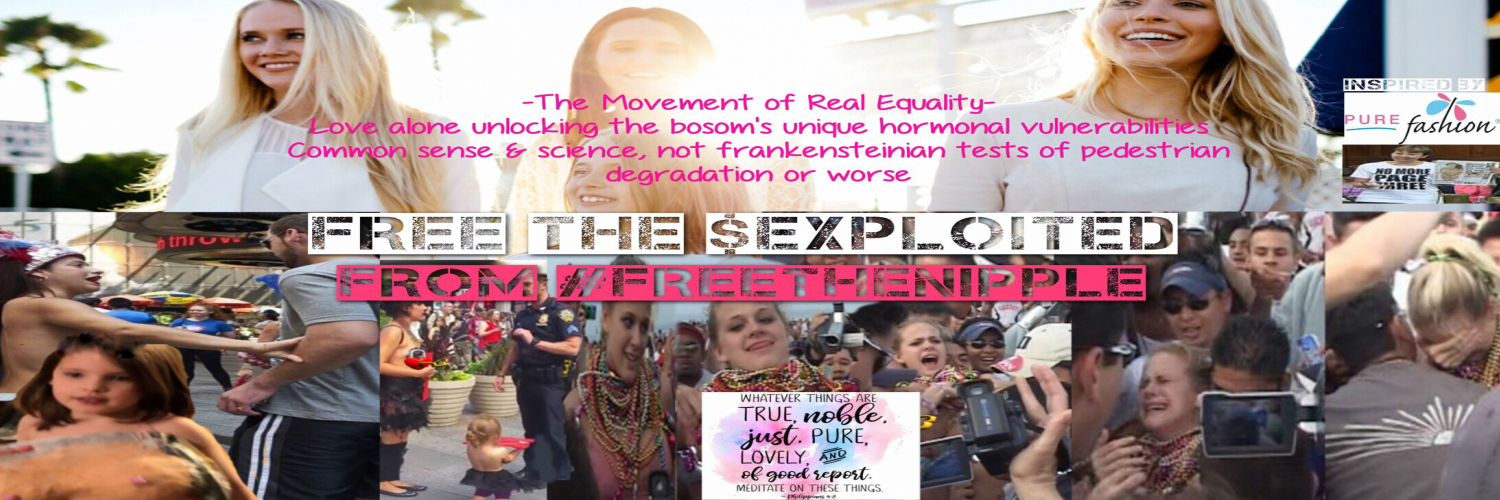 An open letter to Kia Sinclair:
An open letter to Kia Sinclair:
I am well aware as to what the Free the Nipple movement is trying to accomplish. However, it is woefully inaccurate to make the assertion that in not supporting Free the Nipple, one cannot support breastfeeding, an absurdity of course, as I wholly support the latter. Although I’m sure much support has been shored up by presenting Free the Nipple initially as a movement to reduce the shaming of breastfeeding, the two issues at hand are not inexorably intertwined.
The Free the Nipple movement has grievously failed in its main mission statement, creating equality for women and men. Do not delude yourselves into thinking FTN is about equality, it’s about empowerment, which is a very different animal altogether. We aren’t discussing matters such as equal pay for equal work, or equal representation in government or corporate management, the cost of household products for women versus men, women’s under-representation in the tech sector, and the alarming rates of rape and domestic violence toward women. We’re talking about exposing, agree with or not, what is universally perceived, especially by men in the U.S. as a sexual body part, a perception that is not shared for men’s nipples.
The female breast evolutionarily developed, according to many an anthropologist, to attract men. As primates moved from quadrupedal to bipedal motility, the principal physical attractant for males slowly moved from the once prominently displayed buttocks, to the fuller, more voluptuous, curiously butt-shaped breasts we women have developed today. Encouraging women to bare their nipples to empower feminist ideals, is not going to reduce or desensitize a man’s arousal when exposed to bare breasts and nipples.
Aside from supporting breastfeeding, the FTN is misguided in their baby-step approach to reaching women’s equality. Much like trickle-down economists, focusing entirely on one end of the spectrum, and in this case something you yourself claim to be insignificant, does not necessarily translate into further legislation and change in regards to more pressing and important issues, nor is it an effective strategy in producing efficient and radical changes for the betterment of all.
Simply because I wish unicorns exist, or that I could defy gravity and take off to soar the skies at any moment, does not make unicorns any more real, nor allow me to break the laws of physics, or yet defy the physical limitations of my body. Likewise, just because you wish female breasts were not sexual, does not make them not so, and just because the chest of a man is not sexual, does not mean your breasts should not be sexual either.
This is like feeling because men are more predisposed to developing greater musculature, and possess a higher level of free testosterone, that women’s biology should be changed to accommodate these desires. The fact of the matter is the sexes are not the same, and while both sexes need to be treated the same in terms of opportunity and representation, women and men are biologically different, and wishing it weren’t so won’t equalize this for you.
There is an inherent blindness and denial going on here, like claiming racism is dead, or white privilege doesn’t exist. Good intentions or not, these things, as well as many double standards for both men and women persist to this day, and will continue to persist, culturally ingrained in our collective subconscious. Whether a police officer considers himself racist or not, many studies show they are much quicker to shoot a black assailant than a white one, just as though you wish your breasts were not sexual, they are, perceptually, biologically.
My initial letter was not whatsoever directed toward you or your mother, and was indeed simply extolling my views on the movement. I think given your reaction, and your personal attacks, this speaks more to your own insecurities and inferences, and not any implication made on my part. It’s disappointing that someone who is suppose to be a leader and role-model would devolve into personal attacks in an open forum discussing ideas and viewpoints. The way to get your point across is not through ad hominem.
A brief addendum in regards to the other letter, while not specifically mentioning the bareness of nipples in the Bible, the shame of nakedness is constantly referenced. Nakedness is consistently exposed as an abomination, induced as punishment, as well as abolished in the face of the Lord or Jesus, but, understandably, sometimes the forest can be lost for the trees. I think the FTN movement may have spent too much time focusing on the rotten log on the forest floor, and not enough time considering the lush wilderness in front of them.
Chelsea Davis
Tilton


